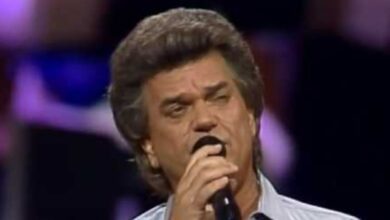Gene Pitney’s “Only Love Can Break a Heart” Becomes a Defining Ballad of 1962
In 1962, Gene Pitney recorded “Only Love Can Break a Heart,” a song that would go on to define his career and solidify his place among the great vocalists of the early rock and pop era. Written by the legendary songwriting duo Burt Bacharach and Hal David, the song was a poignant, heart-wrenching ballad that showcased Pitney’s soaring vocals and deep emotional resonance. Upon its release, the single quickly climbed the Billboard Hot 100, peaking at number two, only held back from the top spot by The Crystals’ “He’s a Rebel.” Despite not reaching number one, it became Pitney’s highest-charting hit in the United States and one of his most beloved recordings.
Gene Pitney was born in 1940 in Hartford, Connecticut, and displayed an early talent for music. As a teenager, he formed a band and honed his skills as a songwriter and performer. His first brush with success came not as a singer, but as a songwriter—he penned hits for other artists, including Ricky Nelson’s “Hello Mary Lou” and Bobby Vee’s “Rubber Ball.” However, Pitney’s distinctive, dramatic voice and natural ability to convey emotion set him apart, leading him to pursue a solo career. By the early 1960s, he had already achieved recognition with songs like “Town Without Pity,” but “Only Love Can Break a Heart” was the track that truly established him as a star.
The song itself was crafted by Burt Bacharach and Hal David, two of the most influential songwriters of the 1960s. Bacharach’s signature sophisticated melodies and David’s heartfelt lyrics combined to create a song that was both elegant and deeply moving. The lyrics, which explore the pain of heartbreak and the bittersweet nature of love, resonated strongly with listeners. Bacharach later admitted that the song was one of his personal favorites from his early career, and Pitney’s performance brought it to life with an intensity that few could match.
The recording sessions for “Only Love Can Break a Heart” took place at Bell Sound Studios in New York City, with Bacharach himself overseeing the arrangement. The production featured a lush orchestral backing, complete with soaring strings and a steady rhythm section that provided a gentle, yet dramatic, foundation for Pitney’s voice. His delivery, filled with longing and vulnerability, perfectly captured the song’s theme of heartache. The song’s arrangement also included Bacharach’s signature rhythmic changes and unexpected chord progressions, which added a level of sophistication rarely found in pop ballads of the time.
Upon its release, “Only Love Can Break a Heart” was met with widespread acclaim. Music critics praised Pitney’s vocal performance, noting his ability to convey emotion without veering into excess. The song resonated with audiences, particularly those who were experiencing heartbreak themselves, and quickly became a staple on AM radio stations across America. Although it was blocked from the number one position on the Billboard Hot 100, it reached the top of the Easy Listening chart, further cementing Pitney’s appeal beyond the teenage rock and roll audience.
The song’s cultural impact was significant, as it represented a shift in popular music toward more sophisticated, orchestral pop arrangements. While rock and roll was still dominant, “Only Love Can Break a Heart” demonstrated that deeply emotional ballads had a place in the mainstream music scene. The song also bridged the gap between traditional pop standards of the 1950s and the more expansive, dramatic songwriting that would define the 1960s.
For Pitney, the success of the song opened new doors. He became a sought-after performer not only in the United States but also in the United Kingdom, where he would go on to achieve even greater success. His ability to sing both rock-influenced tracks and grand ballads allowed him to appeal to a wide range of audiences. As a result, he found himself in demand for television appearances, concert tours, and collaborations with other major artists of the era.
The influence of “Only Love Can Break a Heart” extended beyond Pitney’s career. The song’s orchestral pop style was later echoed in the works of artists like Dusty Springfield and Dionne Warwick, both of whom would work closely with Bacharach and David in the years to come. Its emotional depth and sophisticated arrangement set a new standard for ballads in the early 1960s, inspiring a wave of similarly styled songs that blended classical influences with contemporary pop sensibilities.
Over the years, the song has been covered by several artists, including Sonny James, whose country version reached the top ten on the country charts in 1972. Other notable renditions include those by Jack Jones and Bobby Vinton, both of whom brought their own unique interpretations to the track. However, it is Pitney’s original version that remains the definitive recording, cherished for its authenticity and emotional weight.
At the time of its release, Pitney was experiencing a period of personal and professional transformation. He had established himself not just as a singer but also as a songwriter and musician capable of adapting to the evolving music landscape. His collaborations with songwriters like Bacharach and David allowed him to explore different styles, and “Only Love Can Break a Heart” was a prime example of his ability to bring depth and sincerity to a song.
Decades after its release, “Only Love Can Break a Heart” remains one of Gene Pitney’s most enduring hits. It continues to receive radio airplay on classic oldies stations and is frequently included in retrospectives of the greatest love songs of the 1960s. The song’s timeless theme of heartbreak ensures that it still resonates with new generations of listeners, proving that its emotional power has not diminished with time.
Beyond its immediate success, the song played a crucial role in shaping the future of pop ballads. It paved the way for the rise of adult contemporary music, a genre that would become dominant in later decades. The song’s sophisticated production and deeply personal lyrics influenced future artists, proving that popular music could be both commercially successful and artistically rich.
Though Gene Pitney passed away in 2006, his legacy lives on through songs like “Only Love Can Break a Heart.” His ability to interpret a lyric with sincerity and passion ensured that his music would endure long beyond his time. Even today, the song remains a testament to the golden era of pop balladry, reminding listeners that while love can bring joy, it is only love that can truly break a heart.



